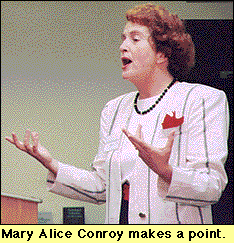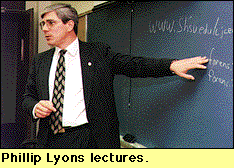
AUSTIN - In a unanimous decision, Texas higher education officials gave a green light for Sam Houston State University's third doctoral offering at their regular board meeting Friday.
With the "yes" vote from the Texas Higher Education Coordinating Board, SHSU officials can begin final preparations to launch a Ph.D. program in Forensic Clinical Psychology next fall.
Final approval of the forensic psychology Ph.D. program follows close behind the board's approval last Spring of SHSU's second doctoral offering, an Ed.D. degree in educational leadership.
The university has offered a Ph.D. in Criminal Justice since 1970.
"To have two doctoral programs approved within the same year is a remarkable feat," said Kenneth Craycraft, Dean of SHSU's College of Education and Applied Science. "It is also an outstanding tribute to the quality of SHSU's faculty and the depth of the university's academic programs."

Last July the coordinating board gave tentative approval for the proposal, but Friday's affirmation clears the way for the university to begin instituting the program.
Forensic psychology is one of the nation's fastest growing psychological specialties, explained David Marcus, an SHSU psychology professor who helped design the Ph.D. program and spearhead the approval initiative.
Practitioners, he said, are in high demand.
In a nutshell, Marcus explained, "forensic clinical psychology involves the application of clinical psychological knowledge to legal questions and legal issues. The term 'forensic' denotes involvement with the legal system."
Forensic clinical psychologists work primarily with prisons, the courts, and law enforcement agencies. They conduct psychological evaluations of prison inmates and of individuals standing trial for various crimes. They frequently testify as expert witnesses in criminal court proceedings and consult law enforcement agencies on psychologically related issues. They also provide psychological therapy and counseling -- a service valued by law enforcement agencies whose personnel have needs unique to their profession.
SHSU's program is one of only five such doctoral programs in the nation, and the only one in the Southwestern United States, Marcus said.
SHSU's proximity to the Texas Department of Criminal Justice headquarters in Huntsville and the program's unique link with SHSU's College of Criminal Justice are two factors distinguishing the university's program from all others.
"One of the real advantages of this program is the fact that it bridges the strengths of two colleges," Craycraft said. "It capitalizes on the expertise of two fine faculties in the Department of Psychology and Philosophy and the College of Criminal Justice. It builds on the foundation of one of the leading criminal justice doctoral programs in the nation."

Other SHSU faculty members who have played an integral role in the development of the Forensic Clinical Psychology doctorate include Phillip Lyons, an SHSU criminal justice professor with a background in forensic clinical psychology, and Mary Alice Conroy, a new member of SHSU's psychology faculty and one of the world's leading experts in forensic assessments.
Also lending invaluable support to the Ph.D. initiative were Kenneth Adams, professor of criminal justice, Cheryl Hiscock-Kalil, professor of psychology, Timothy Flanagan, dean of the College of Criminal Justice; Bobby Marks, SHSU president; and James Gilmore, former SHSU vice president for academic affairs.
(end)